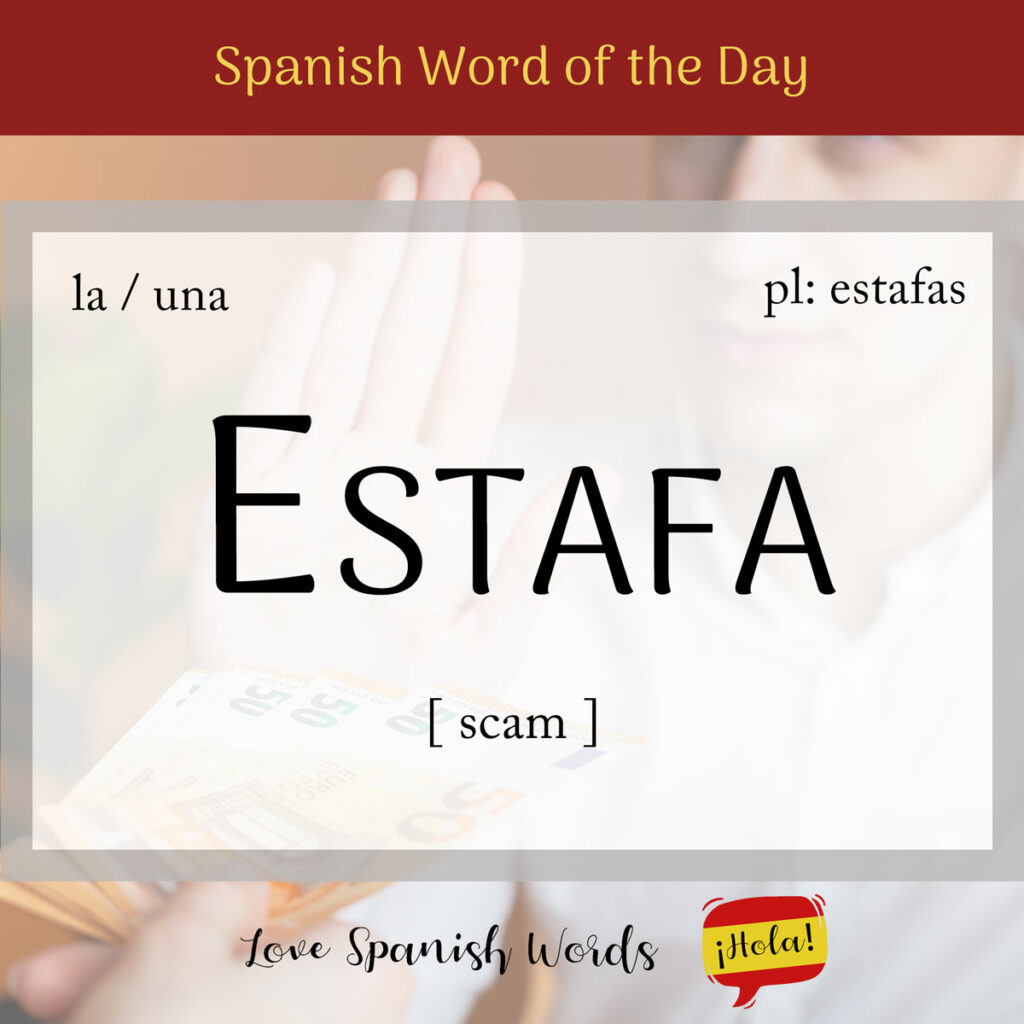The word estafa originates from the Latin word stapha, which to this day still means to trick or deceive. The English translation is scam or fraud, which typically involves deceit to gain money or property.
Latin American Pronunciation
European Pronunciation

Estafa is a feminine noun that takes the following definite and indefinite articles:
- la estafa = a scam
- las estafas = some scams
- una estafa = a scam
- unas estafas = some scams
Estafa is the idea of betrayal and deceit. Usually, it involves financial matters or personal relationships. A person who commits a scam lacks integrity and commits a betrayal of trust. People who commit the estafa are called estafadores (scammers).
El empleado fue arrestado por estafa después de engañar a varias personas.
The employee was arrested for fraud after deceiving several people.
Let’s look at two estafas de negocio (business scams). An estafa de phishing (phishing scam) is a form of cibercrimen (cybercrime) where attackers or estafadores (scammers) impersonate someone or an organisation as a means of stealing sensitive information, such as credit card numbers and passwords.
They do this through deceptive correos electrónicos (emails), llamadas de teléfono (phone calls), or mensajes (messages) that appear to be from reputable sources, such as online services, banks, or known people.
These types of messages usually lead to an enlace (link) that prompts the víctima (victim) to click it through a sense of urgency. The link leads to a sitio web fraudulento (fraudulent website) that mimics the legitimate website, where the victim provides personal and sensitive information. The estafador can then commit robo de identidad (identity theft) or robo de datos (data theft).
Caí en una estafa cuando hice clic en el enlace del correo electrónico.
I fell for a scam when I clicked on the link in the email.
With regards to an estafa de negocio (business scam), there is an estafa (scam) called the esquema ponzi (Ponzi scheme). This scheme involves a victim investing money into a business with promises of high returns with little risk. However, this type of investment creates an illusion of gain for new investors, but instead, the ganancias (profits) generated by the business go towards earlier inversores (investors).
These scams are sometimes referred to as esquemas piramidales (pyramid schemes), where the person sitting at the top of the business gains the majority of the money and leaves little profit for the beginners.
Mi hermano cayó en una estafa piramidal y perdió todos sus ahorros de toda la vida.
My brother fell into a pyramid scam and lost all his life savings.
An estafa personal (personal scam) is usually done by a friend and other times it’s a romance scam. In this type of estafa, a person creates a fake online persona through a sitio de citas (dating site) or redes sociales (social media) and builds a romantic relationship and emotional connection with the victim by acting with charm, using attractive pictures, and sharing personal stories.
Once the víctima (victim) trusts them, they use this trust to explotar (exploit) them financially and emotionally. They create escenarios falsos (false scenarios) to ask the victim for dinero (money). The estafador pretends to have medical emergencies, legal trouble, or other types of crises where the victim is led to help financially through money, loans, gifts, and other methods.
There is a popular documentary called El Estafador de Tinder (The Twindler Swindler) who through deception, lived a luxurious life by stealing millions of dollars from different women through the dating app.
Fui víctima de una estafa amorosa y perdí una gran suma de dinero.
I was a victim of a love scam and lost a large sum of money.
An estafa personal (personal scam) can also be done in person through a false friend or a false romantic partner who leads the victim to believe in opening a business. Once the victim invests, the estafador flees with the money.
Other times, you may use an online site to buy something from an online personnel, such as a phone. When you transfer the money, the estafador disappears and so does his or her fake account.
El teléfono que compré en Marketplace nunca llegó. Fui víctima de una estafa.
The phone I bought on Marketplace never arrived. I was a victim of a scam.
Below are words that are often combined with the Spanish word estafa:
- estafa financiera = financial scam
- estafa piramidal = pyramid scheme
- estafa de identidad = identify theft
- estafa telefónica = phone scam
- estafa en línea = online scam
- estafador profesional = professional scammer
Some synonyms for estafa include fraude (fraud), engaño (deception), timo (scam), and robo (theft).

Spanish metaphors featuring ‘estafa’
In some contexts, estafa can be used metaphorically to describe a situation where trust is betrayed. For example, the following phrase describes how you believe politics is a scam.
La política de ese partido parece una estafa.
That political party’s politics seem like a scam.
The metaphor, La vida es una estafa bien disfrazada (Life is a well-disguised scam), implies that life can often feel deceiving or filled with false promises.
El amor puede ser una estafa en el juego del corazón (Love can be a scam in the game of the heart) is a metaphor that implies that a romantic relationship can sometimes involve deceit.
Spanish idioms featuring ‘estafa’
Hacer una estafa
Literal translation: to commit a fraud
English meaning: to gain money or other financial benefits through trickery or lying
Caer en una estafa
Literal translation: to fall for a scam
English meaning: to believe a scam is true and become a victim of it

